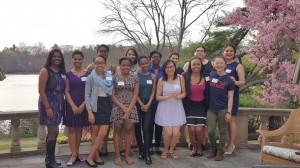 I recently had the opportunity to spend time with some of higher education’s future leaders. They are smart, ambitious, and talented. They are committed to their disciplines and to the pursuit of knowledge. And they are Wellesley women (of course!).
I recently had the opportunity to spend time with some of higher education’s future leaders. They are smart, ambitious, and talented. They are committed to their disciplines and to the pursuit of knowledge. And they are Wellesley women (of course!).
More specifically, they are our 16 students who are part of the Mellon Mays Undergraduate Fellowship (MMUF) program. MMUF is a highly selective program that supports students from underrepresented populations who wish to go on to earn advanced degrees and teach at the college level. This national program has been in existence since 1988, and Wellesley has participated in it since 1989, having now graduated 109 fellows. The goal of the program is simple: to increase the number of underrepresented faculty at colleges across the country. With generous funding from the Andrew W. Mellon Foundation, these fellows are able to work on original research in the humanities and social sciences.
Last week, at this year’s Ruhlman Conference, I enjoyed attending a panel session in which four of our Mellon Mays fellows presented their work. Research included: the ways women of color use online social networks to thrive in the real world; the role of race and religion in college students’ perceptions of mental health; race relations in political protests in this country; and the role of gender and the Brown Berets during the civil rights movement. This past Tuesday, I had the privilege of recognizing our Mellon Mays fellows, as well as their Wellesley faculty and staff mentors, during a reception at my home.
What’s remarkable about the MMUF program is that our students are supported not only by Wellesley faculty and staff who care deeply about them, but by Wellesley faculty who are MMUF alumni themselves.
MMUF is making a quantifiable difference in increasing the diversity of college faculties around the country. It is and will remain an important program to Wellesley and to the future of higher education.